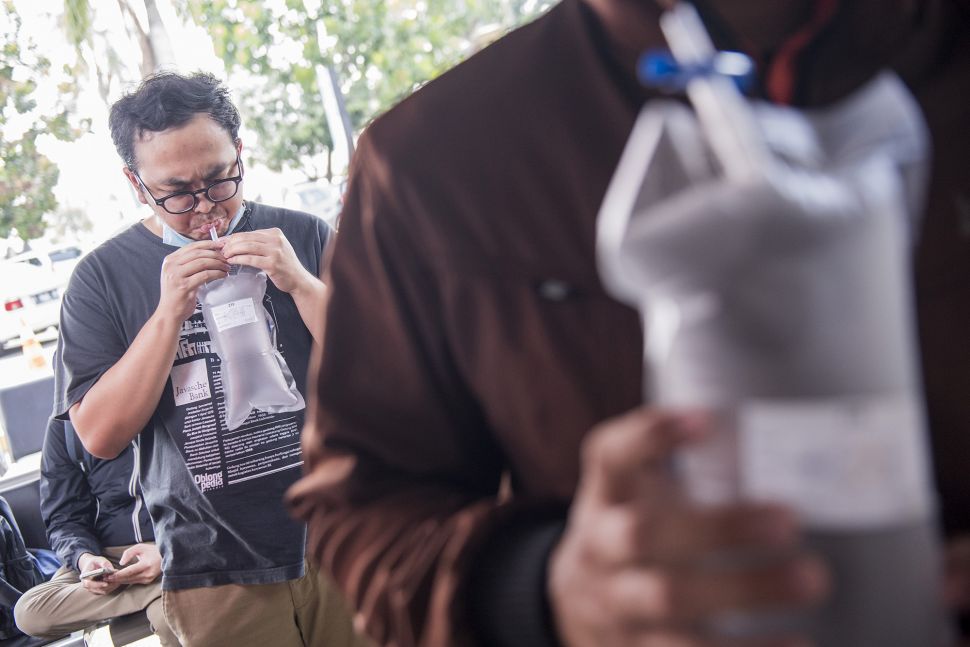Is herd immunity rational?
One million Covid-19 confirmed cases may look like a lot, but is still small (0.37%) relative to Indonesia’s total population. If it is assumed that at least 70% of the population has to be vaccinated to achieve herd immunity, with a basic reproduction number (R0) of 3 and a vaccine efficacy of 65%, achieving herd immunity is almost impossible, theory-wise. Under these assumptions, Indonesia needs to vaccinate almost its entire population, not just 181 million people.
Vaccine priority for the youth population also leaves older adults – the age group with the most at risk from coronavirus infection and death – even more vulnerable. With limited healthcare capacity and the higher risk of infection among the elderly population, healthcare facilities can be easily overwhelmed by a surge of Covid-19 patients.
Given the current situation and constraints, Indonesia needs to rethink its vaccination strategy. Instead of trying to distribute vaccines evenly, vaccination in the early phase needs to focus on the areas most affected by the pandemic while taking into account the capacity of healthcare facilities in each region. Thus, the main objective of current vaccination drive must be laid out rationally. The main goal is no longer on how to achieve herd immunity, but on how to be as efficient as possible in alleviating the burden of existing healthcare facilities.
This strategy is important because there is no single piece of evidence confirming how long the protection provided by the vaccine can last. Several scientific reports have shown that patients infected by Covid-19 can form memory B cells – immune cells that can “remember” viral proteins and trigger antibody production when exposed to the virus for the second time. Natural protection acquired in this manner can only last for eight months.
Using this assumption, a much more progressive vaccination drive is needed, because the government must be able to achieve the target within a period of vaccine-induced immunity. If it persists, herd immunity will not be achieved. For example, if it turns out that the vaccine only provides temporary protection for 10 months, and within this period the vaccination program has only covered 50% of the intended recipients, then herd immunity will be much more difficult to achieve. There will be a double target: one group gets the first dose and the other group gets the second dose – the strategy on how to do this is still unclear.
If herd immunity is a crazy idea that proves nearly impossible, the government should not rely on vaccines as the only ammunition against the pandemic. Indonesia needs non-pharmaceutical intervention, which must be carried out simultaneously, among others through social restrictions and mobility controls. This strategy, which was recently renamed Public Activity Restrictions Enforcement (PPKM), must be evaluated continuously. President Jokowi even admitted in a statement on January 31 that it is not effective. Data on people’s mobility in Java did decline, but not significantly so to make a dent on the number of confirmed cases, patients under treatment, and deaths.
The problem lies in indecisiveness and inconsistency. Concerns about economic fallout should not be a hindrance in implementing mobility restrictions. What President Jokowi said – that there is no standard formula in dealing with this pandemic – is true. “There is no ‘right strategy’. Even those who chose lockdown still see an exponential rise in cases,” he said. If we want to be consistent, vaccination to reduce the burden of healthcare facilities and mortality rate needs to be accompanied by extended mobility restrictions with more consistent implementation in the field. Loosening restrictions to allow the economy to keep staggering along, despite the devastating toll, is also not a wise option.
Vaccination is indeed very complex. The problem goes beyond negotiating and securing a vaccine supply, but also the accuracy of targeting, compliance with implementation, public acceptance, and consistency with other non-pharmaceutical strategies. Without these, we will continue to wallow in an endless pool of suffering from the pandemic. (Ahmad Fuady, MD,PhD.)
Ahmad Fuady, MD,PhD. Researcher and faculty at the Department of Community Medicine, University of Indonesia’s School of Medicine. He received his doctorate in public health from the Erasmus University Rotterdam and is currently a guest researcher at the Department of Pub-lic Health, Erasmus Center Rotterdam, Rotterdam, the Netherlands.









